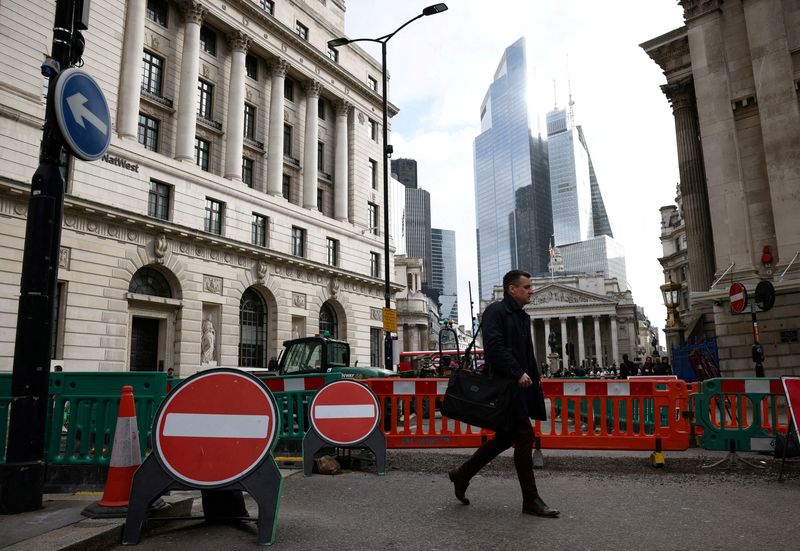By David Milliken
LONDON (Reuters) - The Bank of England looks set to raise interest rates to 4.5% on May 11, matching this week's quarter-point increases by the U.S. Federal Reserve and the European Central Bank, as it tries to fight the highest inflation of any big advanced economy.
The interest rate rise would be the BoE's 12th consecutive rate increase, marking 4.4 percentage points of tightening since December 2021 and the sharpest increase in rates since 1989.
Despite the hikes, inflation has fallen more slowly than the BoE had hoped, dropping to 10.1% in March from 10.4% the previous month - well above the 9.2% rate the BoE had forecast in early February.
Economists polled by Reuters this week were unanimous that the BoE's Monetary Policy Committee (MPC) will raise rates to 4.5% next week, in sharp contrast to a poll two weeks earlier which showed only a slim majority expecting a hike.
"Previously we had seen the MPC holding Bank Rate at 4.25% but the April labour market and March CPI inflation data were too much to ignore," said Peter Schaffrik, global macro strategist at Royal Bank of Canada.
The MPC is likely to split 7-2, according to the Reuters poll, as Silvana Tenreyro and Swati Dhingra again vote to keep rates on hold, arguing that the lagged effect of past tightening will ultimately cause the BoE to significantly undershoot its 2% inflation target.
The big question for investors is how close the majority of the MPC are to joining them.
Broadly, the BoE is seen as in between the Fed - whose Chair Jerome Powell opened the door to a pause on Wednesday - and the ECB, which started tightening later and whose President Christine Lagarde said on Thursday it was too soon to stop.
Only a minority of economists polled by Reuters this week expect the BoE to raise interest rates above 4.5% this year.
But investors in interest rate futures - whose views shift more rapidly - see rates reaching 4.75% or 5% by September.
"As part of keeping its options open, we think the MPC will avoid any reference, explicit or otherwise, to pausing its tightening cycle. Instead we expect it to retain an overall tightening bias," Schaffrik said.
Governor Andrew Bailey will hold a press conference to explain the BoE's thinking at 1130 GMT on May 11.
RECESSION RISK RECEDING
Much of the overshoot in British consumer price inflation can be explained by its high reliance on natural gas imports, which surged in cost after Russia's invasion of Ukraine in February 2022, as well as the timing of energy subsidies.
The BoE forecast in February that inflation would fall sharply from now until the end of the year, taking CPI down to about 4%, and economists do not expect this view to change much.
Britain has also largely dodged any fallout from the collapse of Silicon Valley Bank and Swiss state-backed takeover of Credit Suisse (SIX:CSGN) that might have given the BoE pause before raising borrowing costs again.
Most economists expect the BoE to revise up its growth outlook by enough to erase its previous forecast of a lengthy, five-quarter-long recession, although the outlook remains weak.
Last month the International Monetary Fund forecast Britain's economy would shrink 0.3% this year, more than any other big economy, as well as having the highest inflation.
The BoE's longer-term forecasts, which show inflation undershooting its 2% target in the medium term, are seen as less of a guide than normal, as BoE Governor Andrew Bailey has emphasised upside risks to inflation that they may not capture.
Gnawing at the BoE is the concern that widespread labour shortages and a lack of competition in parts of the economy - partly due to Brexit - may lead to persistent inflation pressures, despite weak underlying growth.
Average wage growth, excluding bonuses, was 6.6% higher in the three months to February than a year earlier - around double its growth rate before the COVID-19 pandemic.
The BoE's own survey of businesses showed companies in April expected to increase wages by 5.4% over the coming year and to raise their own prices by 5.9%, the highest since October.
Set against this is uncertainty about how much of the BoE's past tightening is still to be felt, especially as many fixed-rate mortgages have yet to reset to higher rates, and some households retain a temporary cushion from pandemic savings.
"In our view, further tightening beyond May can't be ruled out," said Andrew Goodwin, chief UK economist at Oxford Economics. "Whether this will mark the peak in rates will depend on the incoming data and the MPC's views on the effectiveness of the monetary tightening already in the system."
